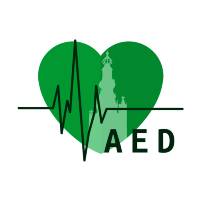Make Amersfoort Heart Safe!
The Amersfoort CPR Volunteer Network
General
The Amersfoort Volunteer CPR Network Foundation (Stichting Reanimatie Netwerk Amersfoort) is a civic initiative supported by the municipality of Amersfoort (Gemeente Amersfoort) and the Regional Ambulance Service of the Utrecht Province (Regionale Ambulance Voorziening Utrecht). It is an officially recognized non-profit organization of public interest. We operate on the basis of formal agreements with the Amersfoort Municipality and with the Regional Ambulance Service. The Heartbeat Now Alert Network (HartslagNu) system is our emergency alerting system. We have set up and operate a network of civilians trained in CPR and publicly available AED (defibrillator) devices in order to provide emergency CPR assistance to victims of sudden cardiac arrest. Our goal is to provide such assistance before the ambulance service arrives. Immediate CPR assistance and early defibrillation (in the first 6 minutes after a cardiac arrest) is essential to substantially increase the chances of surviving a sudden cardiac arrest. Average ambulance response times in Amersfoort are in excess of the critical first 6 minutes (on average around 8-9 minutes; the minimum legal attendance time is 15 minutes). Our goal is to start the CPR and the defibrillation through an AED before the ambulance arrives, in any case within 6 minutes after the collapse.
The Amersfoort Volunteer CPR Network system started in the fall of 2016. Currently, we have over 2,500 volunteers and over 270 AED’s (of which more than 200 are 24/7 available) and the numbers are increasing on a day-to-day basis. This number is already in excess of the minimum requirements of 1% of the local population. Due to local geographical restrictions of Amersfoort (highways, train tracks and the river Eem are intersecting the municipality) we need approximately 2,500 to 3,000 volunteers and 250 AED’s (available on a 24/7 basis) to ensure an appropriate response within 6 minutes after a cardiac arrest has occurred throughout the whole of the municipality of Amersfoort. Neighbouring municipalities have similar networks in place or are setting those up. Our volunteers are regular civilians with an appropriate CPR education and medical professionals, police and fire brigade staff volunteering in their free time.
Our volunteers are alerted by the 112-emergency response center, at the same time as ambulance, police and fire services. The alerting takes place through text message or an app message. Alerting is organised through the countrywide HartslagNu system (www.hartslagnu.nl).
With respect to the availability of AED’s we rely to a large extent on private individuals, businesses and institutions that make their AED's available to our netwerk, preferably in outside cabinets, so that these are available on a 24/7 basis, i.e. also outside business hours. We have a limited number of own AED's in outside cabinets. We are a volunteer organisation with structural subsidy by the municipality. The rest of our funding comes from donations by the general public and businesses.
How the system works
The system works as follows:
- Civilians with a valid CPR certificate (in accordance with the NRR directives) or with professional medical qualifications can register as a “burgerhulpverlener” (civilian CPR volunteer) with www.hartslagnu.nl. You can register your availability (on a 24/7 or more restricted basis). You can register your availability on the basis of your home address and/or your work place and/or your GPS location (for a period of 4-24 hours each time) through the HartslagNu alert system; if you switch on alerting on the basis of your GPS location, you will receive alerts in the whole country.
- When an emergency call is made to the 112-emergency response centre (the European 911/999 system) in respect of a (suspected) cardiac arrest, the CPR protocol is initiated. Under this protocol, not only two ambulances and first responders of the fire brigade and the police are dispatched to the victim’s location, but also many civilian CPR volunteers are alerted (through an app alert (hartslagnu) and text message sent by the HartslagNu system). A number of civilian CPR volunteers are dispatched to the victim’s address to perform CPR and a number of civilian CPR volunteers are sent to fetch a publicly available AED and bring it to the victim’s location. The alert goes out to maximum 100 volunteers which are closest to the victim (based on their home address, work place or GPS location) within a 2.000m radius; the alert is in Dutch and provides either a request to go directly to the victim’s location or to fetch an AED and bring that device to the victim’s location; the alert provides a link to a map and route from your current location to the victim’s location. In practice only a limited number of CPR volunteers show up on time at the incident location (hence the system alerting many volunteers). Volunteers are requested to accept or reject the call. If 5 volunteers have accepted the call, all other alerts are cancelled. For all alerts the three closest AED's to the victim are included in the alert. If a volunteer has an own AED, he/she can of course bring that. Initially, all our AED's were locked with a code lock. The code is included in the alert message. More and more, we remove the locks and replace them by breakable seals, so as to facilitate the quick fetching of the AED. Losses through theft and vandalism so far are minimal.
- The first people present at the victim’s location (whether civilian CPR volunteers or professional first responders) start the CPR and connect the AED to the victim and let it operate.
- There is an agreed protocol in place between the Volunteer CPR Network and the Regional Ambulance Service, the Regional Fire Brigade and the police on each party's conduct at the location of the incident. Please note that the education of CPR volunteers and Fire Brigade/police staff is similar in nature. Many of our volunteers are trained medical professionals. It is important that at the scene good communication takes place about each party's abilities to perform CPR.
- The subsequently arriving responders assist with preparing the location for the arrival of the ambulance crews. If sufficient responders are present, the other responders arriving are advised that their assistance is not required and they should should leave the incident scene.
Participate as a civilian CPR volunteer
If you would like to participate in this system, you need to have a valid CPR certificate under the European Resuscitation Council’s guidelines (preferably under the Dutch Resuscitation council (NRR) guidelines) and be 18 years of age or above. Please note that in The Netherlands CPR protocols include rescue breaths. CPR hands only is not the standard in The Netherlands (but of course if there is no alternative other than CPR Hands Only is preferable to providing no assistance at all). We provide kiss-of-life key chains masks to volunteers that follow our CPR courses. All of the publicly available AED’s in Amersfoort normally provide a pocket mask allowing for safer rescue breaths. The registration with HartslagNu.nl and the alerts are all in Dutch only. In order to participate you will therefore have to have a basic understanding of Dutch.
You own an AED device
If you own an AED device, we encourage you to make this device available to our network. You can do this through www.hartslagnu.nl. If you encounter language difficulties please contact us at info@reanimatienetwerk-amersfoort.nl and we will assist you. We prefer that you make your AED available to our network through an outside cabinet that is accessible on a 24/7 basis. Please do contact us at the above mentioned address if your have any questions or comments. We may be able to provide you with a free cabinet, depending on availability thereof and the exact location of the AED to be installed. We may be able to assist with the installation thereof, free of charge, and the regular AED checks.
Under Dutch law you can charge the costs of usage (replacements of electrodes and in some cases also the battery of the AED) to the Ambulance Service. Please email us to discuss this, if applicable, at info@reanimatienetwerk-amersfoort.nl.
Legal details
Generally, under Dutch law, you are never legally liable if you provide assistance in accordance with your abilities and training (good Samaritan laws apply). Under Dutch law, if you are able to provide assistance to a victim, you are required by law to do so (and if you do not, this is a punishable offence). If you provide emergency care to a victim to the best of your abilities and within the scope of the training you have received, you are not liable if the victim does not survive or incurs harm.
Your qualifications
If you have a CPR certificate which is approved by the European Resuscitation Council, you can participate in this system. Please register at www.hartslagnu.nl The registration procedure is in Dutch. If you would like assistance, please do let us know and we will assist you in registering. Please contact us (in Dutch, English, German or French) at info@reanimatienetwerk-amersfoort.nl.
A CPR certificate in The Netherlands usually has a validity of one year. We offer regular courses (in Dutch; please refer to www.reanimatiecursus-amersfoort.nl for our BLS/AED course calendar). We may be able to organise a course in English if there are 4 participants or more.
Registering as a civilian CPR volunteer
If you register as a civilian CPR volunteer, you can set your availability in the system. Even if you receive an alert, you are not required to attend if that does not suit you at that particular time. I.e. there is no obligation to attend an incident for which you receive an alert. The alert goes out to many people.
Please note the alerts sent are also in Dutch. However, they should be easy to understand and the alert automatically provides a route to the incident location (assuming you have a smart phone).
If you do not have a valid European or Dutch CPR certificate, you will need to obtain such a certificate. We offer basic BLS/AED courses (which take 4 hours), but these are in Dutch. This also applies to the training materials. We may be able to organise a course in English if there are 4 participants or more.
Re-certification courses in English
If you have a recent CPR-certificate, we would be happy to offer you a re-certification course in English if you intend to stay for a longer period of time in the Amersfoort municipality, so that you can join the Amersfoort Volunteer CPR network. You will need to show our instructor your CPR capabilities and we will teach you our local reanimation protocols (which should not deviate substantially from international protocols). If you qualify under our standards we will issue you a certificate which will allow you to register with the Heart Alert Network (HartslagNu).
Further information
Please feel free to send an e-mail to info@reanimatienetwerk-amersfoort.nl to further discuss this in English. We would be happy to assist. Please note that we are a non-profit organisation. It may take some time for our volunteers to respond to your e-mail.



